深圳牛津版初中英语语法复习教案设计:不定代词
英语语法总复习不定代词副词教学案

英语语法总复习不定代词副词教学案介绍本教学案旨在全面复英语语法中的不定代词和副词。
通过本教学活动,学生将能够加强对这些语法知识的理解,并能够正确运用于实际语境中。
教学目标在完成本教学活动后,学生将能够:- 理解不定代词和副词的定义和用法。
- 区分不定代词和副词,并能够正确运用到句子中。
- 大致了解常见的不定代词和副词的列表,并知道它们的基本用法。
- 能够运用所学不定代词和副词来表达自己的想法和需求。
教学过程1. 引入(5分钟)- 给学生展示一些例句,让他们观察并推测出句子中使用的不定代词和副词。
- 引导学生思考不定代词和副词的定义和作用,并与他们讨论出共识。
2. 知识点梳理(10分钟)- 分享一个清晰的不定代词和副词的定义给学生,并进行简短的解释。
- 提供一个有关不定代词和副词的总结表格,列出常见的不定代词和副词以及它们的基本用法。
3. 练和应用(20分钟)- 设计一系列练题,让学生运用所学知识填空或改写句子。
- 引导学生分组合作,互相检查和纠正。
- 鼓励学生在口语实践和写作中使用所学的不定代词和副词。
4. 总结(5分钟)- 回顾本课所学的重点内容,并进行简要总结。
- 提醒学生需要继续在日常研究中运用所学的不定代词和副词,以加强记忆和掌握。
教学资源- 例句和练题- 不定代词和副词的定义和用法总结表格评估教师通过观察学生在练和应用中的表现来评估学生的掌握程度。
可以进行口头回答问题、写作作业、或进行小组演示等形式的评估。
扩展活动- 要求学生撰写一个小短文,要求其中要包含不定代词和副词。
- 让学生观察和分析英语文章中的不定代词和副词的用法。
参考资料以上是关于英语语法总复习不定代词副词的教学案。
通过有针对性的教学过程,学生将能够更好地理解和应用这些语法知识,提高他们的英语运用能力。
深圳牛津版初中英语语法复习教案:不定代词
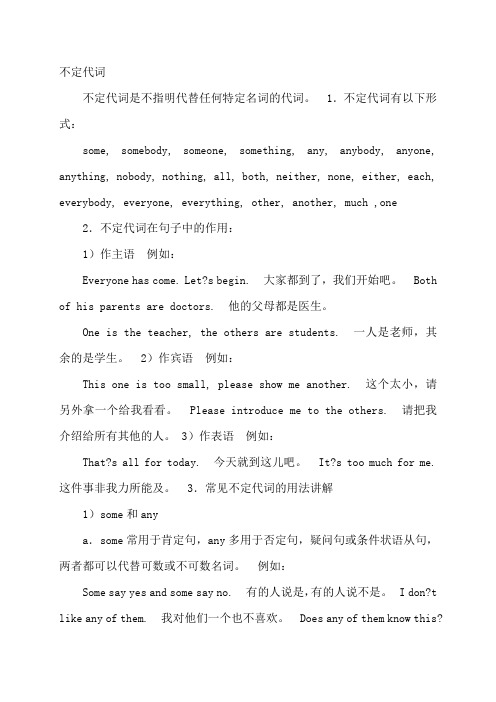
不定代词不定代词是不指明代替任何特定名词的代词。
1.不定代词有以下形式:some, somebody, someone, something, any, anybody, anyone, anything, nobody, nothing, all, both, neither, none, either, each, everybody, everyone, everything, other, another, much ,one2.不定代词在句子中的作用:1)作主语例如:Everyone has come. Let?s begin. 大家都到了,我们开始吧。
Both of his parents are doctors. 他的父母都是医生。
One is the teacher, the others are students. 一人是老师,其余的是学生。
2)作宾语例如:This one is too small, please show me another. 这个太小,请另外拿一个给我看看。
Please introduce me to the others. 请把我介绍给所有其他的人。
3)作表语例如:That?s all for today. 今天就到这儿吧。
It?s too much for me. 这件事非我力所能及。
3.常见不定代词的用法讲解1)some和anya.some常用于肯定句,any多用于否定句,疑问句或条件状语从句,两者都可以代替可数或不可数名词。
例如:Some say yes and some say no. 有的人说是,有的人说不是。
I don?t like any of them. 我对他们一个也不喜欢。
Does any of them know this?他们当中有谁知道吗?b.如果在提问时期待对方肯定回答,或鼓励别人说yes时,疑问句中的不定代词要用some,不用any。
Unit 1语法Grammar some和any及复合不定代词讲义 牛津深圳版英语八年级上册
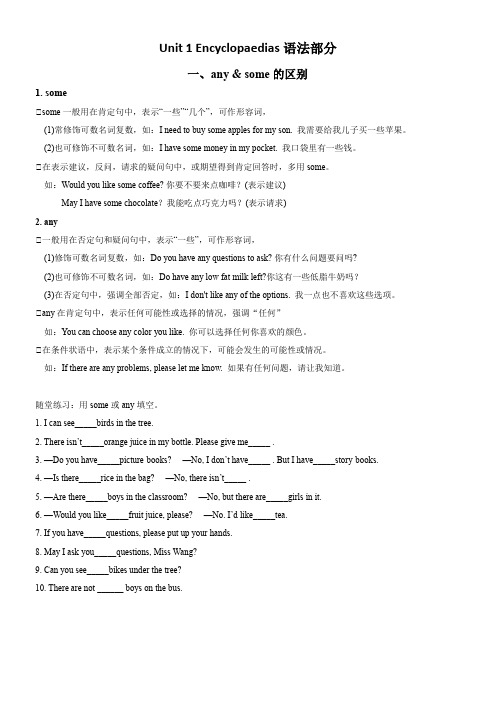
Unit 1 Encyclopaedias语法部分一、any & some的区别1. some①some一般用在肯定句中,表示“一些”“几个”,可作形容词,(1)常修饰可数名词复数,如:I need to buy some apples for my son. 我需要给我儿子买一些苹果。
(2)也可修饰不可数名词,如:I have some money in my pocket. 我口袋里有一些钱。
①在表示建议,反问,请求的疑问句中,或期望得到肯定回答时,多用some。
如:Would you like some coffee?你要不要来点咖啡?(表示建议)May I have some chocolate?我能吃点巧克力吗?(表示请求)2. any①一般用在否定句和疑问句中,表示“一些”,可作形容词,(1)修饰可数名词复数,如:Do you have any questions to ask?你有什么问题要问吗?(2)也可修饰不可数名词,如:Do have any low fat milk left?你这有一些低脂牛奶吗?(3)在否定句中,强调全部否定,如:I don't like any of the options. 我一点也不喜欢这些选项。
①any在肯定句中,表示任何可能性或选择的情况,强调“任何”如:You can choose any color you like. 你可以选择任何你喜欢的颜色。
①在条件状语中,表示某个条件成立的情况下,可能会发生的可能性或情况。
如:If there are any problems, please let me know. 如果有任何问题,请让我知道。
随堂练习:用some或any填空。
1. I can see_____birds in the tree.2. There isn’t_____orange juice in my bottle. Please give me_____ .3. —Do you have_____picture-books?—No, I don’t have_____ . But I have_____story-books.4. —Is there_____rice in the bag?—No, there isn’t_____ .5. —Are there_____boys in the classroom?—No, but there are_____girls in it.6. —Would you like_____fruit juice, please?—No. I’d like_____tea.7. If you have_____questions, please put up your hands.8. May I ask you_____questions, Miss Wang?9. Can you see_____bikes under the tree?10. There are not ______ boys on the bus.二、复合不定代词1.构成2.区别(1)something,somebody,someone通常用于肯定句;anything,anyone,anybody通常用于否定句、一般疑问句或条件状语从句中。
深圳市沪教牛津八年级英语上册unit1 语法:复合不定代词
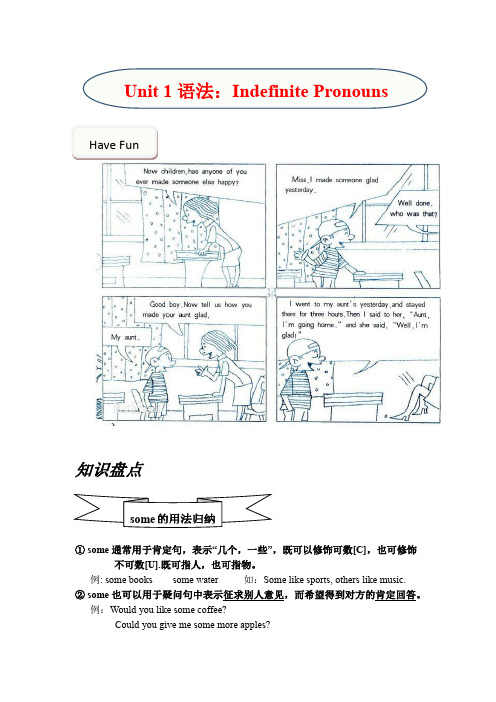
Unit 1语法:Indefinite Pronouns Have Fun知识盘点some的用法归纳① some通常用于肯定句,表示“几个,一些”,既可以修饰可数[C],也可修饰不可数[U].既可指人,也可指物。
例: some books some water 如:Some like sports, others like music.② some也可以用于疑问句中表示征求别人意见,而希望得到对方的肯定回答。
例:Would you like some coffee?Could you give me some more apples?③ some 有时可修饰单数可数名词,表示“某个”。
例:This morning, some boy asked for you.There must be some reason for what he’s done.any通常用于否定句、疑问句或条件句,修饰单数或复数可数名词以及不可数名词。
例:If there are any new magazines in the library, take some for me.图书馆如果来了新杂志,替我借几本。
Are there any stamps in the drawer? 抽屉里有邮票吗?Is there any money with you? 你身上带钱了吗?② any 还可以用于肯定句,作“任何的”解。
例:You can come here any time. 你什么时候来都行。
You can get it at any shop. 你可以在任何一家商店买到它。
① few 的意思是“没有几个”; a few 的意思是“少数”, “几个”; 修饰可数名词;a few 表示肯定意义, few 表示否定意义。
例:The problem is so difficult that few people can solve it. 这个问题太难了,几乎没人能做出来。
牛津深圳版 7年级英语上册期末复习语法学案
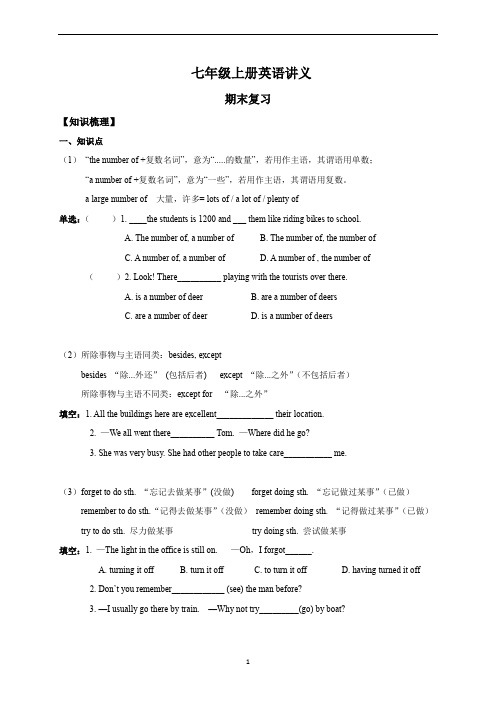
七年级上册英语讲义期末复习【知识梳理】一、知识点(1)“the number of +复数名词”,意为“.....的数量”,若用作主语,其谓语用单数;“a number of +复数名词”,意为“一些”,若用作主语,其谓语用复数。
a large number of 大量,许多= lots of / a lot of / plenty of单选:()1. ____the students is 1200 and ___ them like riding bikes to school.A. The number of, a number ofB. The number of, the number ofC. A number of, a number ofD. A number of , the number of()2. Look! There__________ playing with the tourists over there.A. is a number of deerB. are a number of deersC. are a number of deerD. is a number of deers(2)所除事物与主语同类:besides, exceptbesides “除...外还”(包括后者) except “除...之外”(不包括后者)所除事物与主语不同类:except for “除...之外”填空:1. All the buildings here are excellent_____________ their location.2. —We all went there__________ Tom. —Where did he go?3. She was very busy. She had other people to take care___________ me.(3)forget to do sth. “忘记去做某事”(没做) forget doing sth. “忘记做过某事”(已做)remember to do sth.“记得去做某事”(没做)remember doing sth. “记得做过某事”(已做)try to do sth. 尽力做某事try doing sth. 尝试做某事填空:1. —The light in the office is still on. —Oh,I forgot______.A. turning it offB. turn it offC. to turn it offD. having turned it off2. Don’t you remember____________ (see) the man before?3. —I usually go there by train. —Why not try_________(go) by boat?(4)continue doing sth.意为“继续做原来的事”continue to do sth. 意为“继续做某事(另一件事情)”stop to do sth.“停下来去做某事”stop doing sth.“停下做某事”填空:1. After reading Lesson Nine,he continued____________(read) Lesson Ten.2. We were so tired that we stopped___________(work).(5)used to do sth“过去常常”be used to (doing) sth. “习惯于(做)...”used to do sth.的否定句:主语+did not use to do sth.一般疑问句:e to...?特殊疑问句:特殊疑问词+did+主语+use to do sth.?填空:1. I never _____ ______eat cakes, but I eat a lot now.2. I’ve lived in Paris for six years now, so I’m quite ______ _____ the traffic.3. I don’t play tennis much these days, but I _____ ______.4. You’ll soon get u sed to ___________(live. in the country.5. Where______ Grandfather________ _________ live?(6)neither...nor... “既不...也不... ”either...or... “要么...要么...”not only…but also….“不仅…而且…”(就近原则)填空:1)Neither you or she_________ (be) good at drawing.2)Not only the students but also the teacher_________ (like) football.3)_______ you _______ I ________ going there. (或者你去,或者我去)(7)四“花费”sb. spend time/ money on sth. 在……上花费时间(金钱)sb. spend time (in) doing sth. 花费时间(金钱)做某事pay (sb.) money for sth 付钱(给某人)买……sth. costs (sb.) money 某物花了(某人)多少钱It takes sb. time to do sth. 做某事花了某人多少时间填空:1. I have to________ them 20 pounds for this room each month.2. It will________ me too much time to read this book.3. The science book________ me a great amount of money.4. They_______ too much time writing the report.(8)look 的常用词组:look at 看look up 查阅look for 寻找look after =take care of 照顾look out 小心look over 检查(9)enjoy doing sth. “喜欢做某事”(10)a lot表示程度,“很”;a lot of= lots of + 可数名词复数/不可数名词“许多”(11)talk with/ about/ to speak+语言say+内容tell sb. sth.,tell sb.(not) to do sth,(12)want to do sth. “想要做某事”(13)give sth. to sb. = give sb. sth. “给某人某物”(14)take“拿走”,bring“带来”,get “去拿来”,carry“携带”且可表“负重”之意(15)be kind to sb. = be friendly to(16)be angry with sb. “生某人的气”(17)change one's mind “改变想法”(18)be able to do sth. “能够做某事”(19)be famous for “因...而出名”be famous as“作为...而出名”(20)be afraid of “害怕...”be afraid that+从句二、语法1. 冠词:“a+辅音开头的可数名词;an+元音开头的可数名词the用法:①特指;②指独一无二的事物;③序数词、形容词最高级前;④the+姓氏复数,表示一家人。
牛津沪教版七上英语-不定代词的用法专题教案
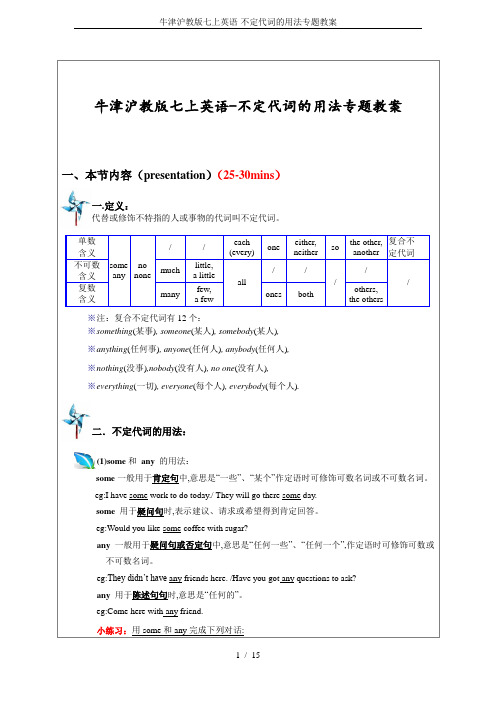
eg:Neither of the answer is right.(两个答案都不对)
Ihave neither time nor money to take a trip.
Eithersentenceis right.(两个答案中有一个是对的。)
You can either go or stay.
※nothing(没事),nobody(没有人), no one(没有人),
※everything(一切), everyone(每个人), everybody(每个人).
二.不定代词的用法:
(1)some和any的用法:
some一般用于肯定句中,意思是“一些”、“某个”作定语时可修饰可数名词或不可数名词。
Lucy:Good idea!When can we start our homework?
Lily:We can start to do our homework at ________ time.
keys:some, some, some, some, any, some, any, some, any
4.I haven't got__________time for study in recent weeks.
keys:much,many,many,much
(3)few、little、a few、a little的用法:
可数
不可数
肯定
a few(有一些)
a little(有一些)
否定
few(几乎没有)
1.There are________young people here now than there used to be.
牛津深圳版七年级上下册英语 语法教案及练习:第3讲 代词
牛津深圳版七年级上下册英语 语法教案及练习专题学习-代词【导入】【重点讲解】 知识点1 人称代词人称代词起代表人和事物的作用,有人称、数和格的变化。
1.人称代词的形式人称第一人称 第二人称 第三人称 单数复数单复数单数复数主格 I 我 we 我们 you 你 he,他 she, 她it 它 they 他们 宾格 me 我us 我们you 你him 他, her 她, it 它them 他们2.人称代词的用法成分说明例句作主语人称代词主格在句中作主语,通常放在句子的句首,代替上文提到的人、物或事。
Tom is my classmate. He likes watching TV. (He主格作主语替代Tom)作宾语人称代词宾格在句中作谓语动词或介词宾语。
My mother loves me. (me宾格作动词love的宾语)【知识拓展】1.人称代词在than之后与其他人或事物进行比较时,用主格和宾格都可以。
He is taller that I/me.他比我高。
2.人称代词在句中并列使用时,单数单数情况的顺序为:“二,三,一人称”,即you, he and I;复数情况的顺序为“一,二,三人称”,即we,you and they。
如果要承担责任,说话者则把第一人称((I 或we)放在最前面。
例如: You, she and I can answer the question. 你,她和我能回答这个问题-Who broke the window?谁打破了窗户? -I and Tom.我和汤姆。
3. she常可以代表国家、大地、月亮、太阳、船只等。
例如:China will always do what she promised to do.中国总是言出必行。
4, it的特殊用法:①常用来代替不明性别的小孩。
It is a lovely child.那真是个可爱的孩子。
②指代this或that。
例如: That must be a cat, isn't it?那一定是只猫,不是吗?③指代时问、距离、天气、环境等。
_Unit 8 collecting things语法代词学案 牛津深圳版英语七年级上册
七上Unit 8 Collecting things语法(代词)【学习目标】1.掌握unit 8语法人称代词、物主代词,不定代词知识点的用法及其应用【课前小测】一、用所给词的适当形式填空。
1.Are these ________(you)pencils? Yes, they are ________(our). 2.—Whose is this pencil? —It’s ________(I).3.I love ________(they)very much.4.She is________(I)classmate.5.Miss Li often looks after________(she)brother.6.—Are these ________(they)bags ?—No, they aren’t ______(their). They are _____(we)7. Ms Ding teaches _______(we) maths.8. Bob loves _______(he) mother very much.9. Do they know ________ (they) new teacher?10. I have a lovely cat, ______ (it) name is Carl.11. Jim is a very good boy. We all like ______(he).12. The boy under the tree is Henry. This is _______ (he) bike.13. She doesn’t like _______(she) new dress at all. Who bought (买) it for______(she)?14. Who is the man over there? ________ is _______ (we) headmaster.15. Is this red coat yours? No, _________ is yellow(it)二、写出下列代词变化形式。
牛津译林版七年级下册(语法教案)Unit8不定代词精讲精练
(08)牛津译林版七年级下册Unit8 不定代词精讲精练一. 定义不定代词是由some-, any-, no-, every-加上-one,-body,-thing等构成的。
不定代词包括something, somebody, someone, anything, anybody, anyone, nothing, nobody, no one, everything, everybody, everyone等。
二. 不定代词的用法(1)不定代词的指代对象a)含-body和-one的不定代词只能指代人,两者功能意义完全相同,可以互换。
Someone/ Somebody is crying in the next room.b)含-ing的不定代词只能用来指事物。
Are you going to buy anything?(2)不定代词的用法a) 不定代词some-常用于肯定句。
疑问句中希望得到对方肯定回答时,也会用不定代词some-。
I know someone named Tony.Would you like something to drink?b) 不定代词any-常用于否定句和疑问句中。
I didn’t see anything on the desk.(3)不定代词的数不定代词都具有单数的含义,因此通常被看成是第三人称单数。
当他们作主语时,其后谓语动词用第三人称单数形式。
Nothing is difficult if you put your heart into it.世上无难事,只怕有心人。
(4)不定代词的定语不定代词的定语必须后置,即放在不定代词后面。
Is there anybody important here?三. 练习I. 选择题1. My computer doesn’t work. There must be ___________ wrong with it.A. anythingB. nothingC. somethingD. everything2. Put it down, Richard. You mustn’t read _________ letter.A. anyone’s else’sB. anyone’s elseC. anyone else’sD. anyone else3. –Did Qingdao show __________ to the world during the SCO Summit (上海合作组织峰会)?- Sure! Her beauty, high technology and rapid development.A. something specialB. anything specialC. special somethingD. special anything4. –Would you like _________ to eat? Yes, please.A. anything deliciousB. delicious anythingC. something delicious5. –There’s ________ in the city. Why not have a picnic in the countryside?--Great. Daweishan Mountain might be a good choice.A. interesting somethingB. nothing interestingC. anything interesting6. –I want something to read. Would you please give me _________ to read? --Let me see.A. anything interesting enoughB. anything enough interestingC. something enough interestingD. something interesting enough7. –Tom, please come here. I have _________ to tell you.--OK. I’m coming.A. anything importantB. important somethingC. something importantD. anything important8. Is there ___________ with your computer? I can’t start it.A. something wrongB. anything wrongC. wrong somethingD. wrong anything9. –You look pale today, Madam! What’s the matter with you? --_______ serious. Just a cold.A. SomethingB. AnythingC. NothingD. Everything10. –I found ________ in the room. Where have they gone?A. nobodyB. somebodyC. anybodyD. everybody11. –Do you get ________ ready for the trip to Beijing?-Yes, now we have _______ to do.A. anything; somethingB. anything; nothingC. everything; somethingD. everything; nothing12. As the lights in the room went out, it was very dark and _______ could be seen clearly.A. somethingB. anythingC. everythingD. nothing13. –I found _______ in the room. Where have they gone? –They’ve gone to the sports meeting.A. nobodyB. somebodyC. anybodyD. everybody14. –Isn’t there ________ with your washing machine, Aunt Wang?--_________. Can you fine someone to help me fix it?A. anything wrong; YesB. anything wrong; NoC. wrong something; NoD. wrong anything; No15. –Suzy, would you like _______ to drink?--No, thanks. I’m full. I can’t eat ________.A. something; somethingB. anything; anythingC. something; anythingD. anything; something16. –Is there ________ in your magazine?--Yes. It’s said that the longest snake is 15 meters long in the world.A. something amazingB. anything amazingC. something differentD. anything different17. –Why do you look so sad?--_______ with my new car.A. Something are wrongB. Something is wrongC. There’s nothing wrongD. There’s anything wrong18. The little girl is ________ to pick apples on the big apple tree, but there aren’t ______ on the tree.A. Enough old; enough applesB. enough big, enough applesC. old enough; enough applesD. big enough, enough apples19. –What are you going to give your mother for her birthday?--I think I’ll buy her ___________.A. something specialB. special somethingC. anything specialD. special anything20. --Did Taizhou shoe ______ to the people during Taizhou Fair () last month?--Sure! Here health, beauty (美丽) and culture(文化).A. something specialB. anything specialC. special somethingD. special anything21. --Doctor, is there anything wrong with my arms? --No. _________ is OK.A. somethingB. EverythingC. NothingD. Anything22. --Did Taizhou shoe ______ to the people during Taizhou Fair () last month?--Sure! Here health, beauty (美丽) and culture(文化).A. something specialB. anything specialC. special somethingD. special anything23. --Do you have anything important to say for yourself? --________ except (除了) sorry.A. SomethingB. EverythingC. AnythingD. Nothing24. My little girl saw ________ outside. Shall we go and have a look?A. strange somethingB. something strangeC. anything strangeD. strange nothing25. I looked for my pen _________, but I can’t find it __________.A. everywhere; anywhereB. anywhere; everywhereC. somewhere; everywhereD. everywhere; somewhere。
牛津深圳版中考英语复习语法专题 代词 讲义
中考语法复习:代词定义:用来代替名词、名词短语或句子的词称为代词。
代词可分为:人称代词、指示代词、疑问代词、反身代词、相互代词和不定代词等。
一、人称代词和物主代词1. 表示“你…‘我…‘他/她/它”“你们”“我们”“他/她/它们”的词叫人称代词。
人称代词有人称、数和格的变化。
人称代词有主格和宾格之分。
主格宾格单数复数单数复数第一人称I we me us第二人称you you you you第三人称he/she/it they him/her/it them2. 物主代词就是表示所属关系的代词。
物主代词可分为形容词性物主代词和名词性物主代词两大类。
形容词性物主代词名词性物主代词单数复数单数复数第一人称my our nine ours第二人称your your yours yours第三人称histheirhistheirs her hersits its例题1Mrs Smith often goes to visit those AIDS patients in hospitals to cheer ____ up.A. herB. themC. himD. us例题2 If ________is a high-Stress job, it is important that you learn how to relax after a busy day.A. youB. yourC. yoursD. yourself注意:1. 几个人称代词并列充当主语时, 它们的顺序是:单数:“二、三、一”you, he/she and I复数:“一、二、三”we, you and they2. 形容词性物主代词只能放在名词前作定语。
如:my pen pal我的笔友her name她的名字3. 名词性物主代词常用来避免前面已经提及的名词, 相当于“形容词性物主代词十名词”。
如:This book is mine. Yours is on your desk. 这本书是我的。
- 1、下载文档前请自行甄别文档内容的完整性,平台不提供额外的编辑、内容补充、找答案等附加服务。
- 2、"仅部分预览"的文档,不可在线预览部分如存在完整性等问题,可反馈申请退款(可完整预览的文档不适用该条件!)。
- 3、如文档侵犯您的权益,请联系客服反馈,我们会尽快为您处理(人工客服工作时间:9:00-18:30)。
不定代词不定代词是不指明代替任何特定名词的代词。
1.不定代词有以下形式:some, somebody, someone, something, any, anybody, anyone, anything, nobody, nothing, all, both, neither, none, either, each, everybody, everyone, everything, other, another, much ,one2.不定代词在句子中的作用:1)作主语例如:Everyone has come. Let?s begin. 大家都到了,我们开始吧。
Both of his parents are doctors. 他的父母都是医生。
One is the teacher, the others are students. 一人是老师,其余的是学生。
2)作宾语例如:This one is too small, please show me another. 这个太小,请另外拿一个给我看看。
Please introduce me to the others. 请把我介绍给所有其他的人。
3)作表语例如:That?s all for today. 今天就到这儿吧。
It?s too much for me. 这件事非我力所能及。
3.常见不定代词的用法讲解1)some和anya.some常用于肯定句,any多用于否定句,疑问句或条件状语从句,两者都可以代替可数或不可数名词。
例如:Some say yes and some say no. 有的人说是,有的人说不是。
I don?t like any of them. 我对他们一个也不喜欢。
Does any of them know this?他们当中有谁知道吗?b.如果在提问时期待对方肯定回答,或鼓励别人说yes时,疑问句中的不定代词要用some,不用any。
例如:Would you like some of the tickets? 你想要些票吗?c.在强调“任何一个”意思的时候,any也可用于肯定句。
例如: You can take any of the newspapers here. 你可以拿这儿任何一份报纸。
2)either和neithereither用于肯定,neither用于否定,二者均限于两个个体的情况。
例如:You can see tall trees on either of the river banks. 在河的两岸你们能看到高大的树。
Neither of them wants to see the film with me. 他们两个谁也不想和我去看电影。
3)one和onesone可以指某人,人人或某物,也可以用来代替上文中提及的可数名词,以避免用词的重复。
当one指人时,其反身代词为oneself,所有格形式是one?s。
例如:One should follow the laws. 人人应该遵守法律。
The one in red is our monitor. 穿红衣服的那位是我们的班长。
Shanghai has a lot of new buildings, but it also has many old ones. 上海有很多新的建筑物,也有不少老的建筑物。
4)复合不定代词复合不定代词是some, any, no, every同body,one, thing等词构成的代词。
复合不定代词都可看作单数,表示“某人”或“某物”,并在句中作主语、宾语或表语。
同some和any在用法上的区别一样,some, someone 和something一般用于肯定句,anybody, anyone和anything一般用于否定句、疑问句和条件状语从句中。
例如:We want somebody to help us. 我们想要有人来帮助我们。
Have you found anything here? 你们在这儿发现什么了吗?If anyone comes to visit us, tell him we have gone to the cinema. 如果有人来访,就告诉他我们去电影院了。
表示人的复合不定代词后面都可以加?s构成所有格。
例如:Somebody?s wallet has just been stolen. 有人的钱包刚刚被偷了。
复合不定代词要求后置定语。
例如:We will have something important to do this afternoon. 今天下午我们有些重要事情要做。
疑问代词疑问代词是用来构成特殊疑问句的代词,如who, whom, whose, what 和which等。
在疑问句中,疑问代词一般都放在句首,并在句中充当主语、宾语、表语或定语。
例如:Who is your maths teacher? 谁是你们的数学老师? Whose bag isthat? 那是谁的书包?Who teaches you English? 谁教你们英语?Whom are you talking about? 你们在谈论谁?相互代词相互代词是表示相互关系的代词,其形式如下表。
主格和宾格所有格 each other each other?s one another one another?s 在当代英语中,each other和one another意思上没有区别,它们在句中可以作宾语,其所有格可以作定语。
例如:Do you often help each other? 你们经常互相帮助吗?We are interested in one another?s work. 我们对彼此的工作感兴趣。
三、随堂监测A组 I. 选择填空:1.This dictionary is not hers. It?s _______.A. IB. meC. mineD. my 2. --- Is this ______ magazine? --- No, it isn?t. It?s ________.A. your, herB. hers, mineC. yours, hersD. your, hers 3. There are two books on the desk. One is a maths book, _______ is an English book. A. others B. other C. the other D. another 4. _______ of the girls plays tennis well.A. NeitherB. BothC. AllD. Some 5. Mary speaks very quickly. _______ is difficult to understand what she is saying. A. That B. she C. It D. There 6. The school was built by the villagers _______.A. usB. ourselvesC. themD. themselves 7. He put a finger into ______ mouth and sucked it. A. his B. he C. him D. his?s 8. He is always ready to help ______. A. another B. others C. the other D. other 9. Let _______ do this exercise myself. A. himB. herC. usD. me10. Have you _______ to tell us?A. important somethingB. something importantC. important anythingD. anything important11. I met an old friend of ______ on ______ way home. A. mine, my B. my, the C. mine, a D. mine, the 12. ______ of the studentsin our class has a ticket. A. Every B. Both C. Each D. All13. There are several books on the desk.. _____ of them is English.A. AllB. BothC. NoneD. Neither 14. _______ live in Shanghai.A. WeB. OurC. OursD. Ourselves15. --- Is this ______ jacket? --- Yes, it?s _______. A. her, her B. her, hers C. hers, her D. hers, hers 16. --- _______ is that boy? --- He?s my son. A. Who B. Whom C. What D. Which17. _______ humans ______ animals can live without air.A. Both, andB. Neither, norC. Either, orD. Not only, but also18. They have twenty-six desks in the classroom. One is for the teacher, ______ are for the students. A. the other B. other C. theothers D. others19. My dictionary is in my bag. Where is _______? A. yours B. you C. yourself D. your xx年2.基数词的复数形式表示大量的的数目,在这种情况下,表示单位的基数词词尾加-s,要与of短语连用。
3.基数词在句中的作用基数词的作用相当于名词和形容词,它在句子中可充当主语,宾语,表语和定语。
例如:Three and five is eight. 3+5=8 主语表语How many oranges do you want?你要多少桔子? I want eight. 我要八个。
